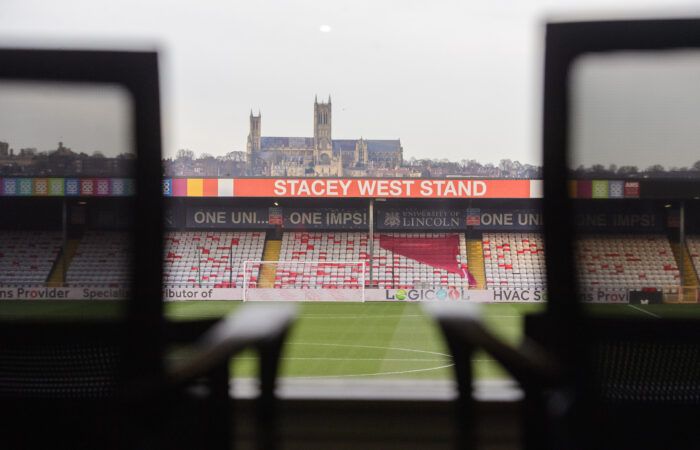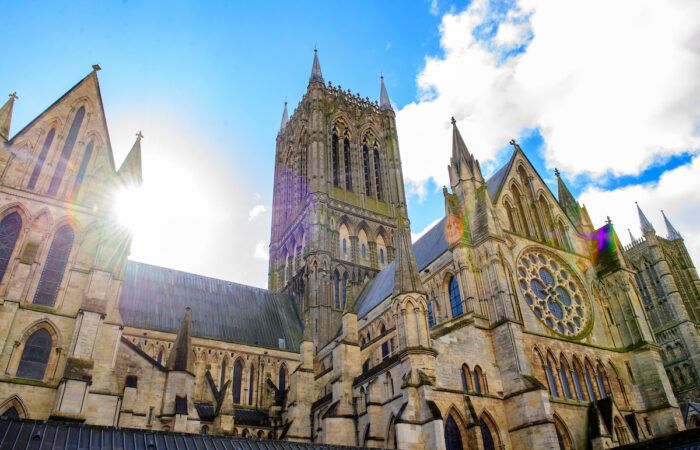Sermon by the Very Reverend Christine Wilson, Dean of Lincoln
I wonder how many times you have missed out on something extraordinary. One of those memorable moments, when your friends said – “Oh you just missed it” or “you should have been there.”
Today there has been a mass exodus from Lincoln as the city heads off to watch the Imps play at Wembley. We can guarantee that if we win, they will be telling us just what we missed for many weeks to come.
Poor Thomas is the man who misses out on an extraordinary encounter with the risen Christ, because he was somewhere else. As the community experiences the event he becomes the one who missed it.
It was that point in the story, post crucifixion, with the disciples wondering what to do next. Grieving, hiding away in an upper room, with none of the confidence and reignited hope that is to come.
We have this wonderfully human account of Thomas full of doubt and wanting evidence of their unbelievable claims. There is a real sense that he needs to catch up and understand.
What Thomas does know is that their encounter with Jesus has changed them.
Here is Thomas full of incredulity wanting to see for himself in order to believe.
Generally, our rational minds want evidence to get to the truth rather than the claims of others.
That is probably even more true today in a world of fake news and the mistrust of grand narratives.
If we think of our criminal justice system, the accounts of the witnesses and the gathering of evidence are vital to making a judgment – but we know too that even the expert witnesses, and indeed our own moral leaders, can come under heavy scrutiny in the search for the truth.
There has always been room for a healthy dose of doubt and a bit of tussling with the questions in the journey of a living faith.
Graham Ward, Regus Professor of Divinity at Oxford has spent many years exploring the question: What makes faith believable?
He suggests it is not just a cognitive exercise about knowledge and reasoning. Assembling evidence will always be subject to human manufacturing, bias and prejudgments.
Ward suggests that belief is also shaped by the way we perceive things – according to our hopes, our cultural traditions and in the case of Thomas our suspicions.
Belief appeals to the views and understanding of the collective, the tribe.
It will be evidenced in the way that we choose to live out belief and embody it through our actions.
When we look at the texts before us this morning – from our faith tradition – we encounter more than words on the page. We know the impact it had on those who testified to the resurrection.
If we look at the account in Acts this morning we discover a radical change in the behaviour of Christ’s followers and the development of a flourishing community, infused heart and soul in unity of purpose, living generously, full of the bonds of love.
From other accounts we know that from a community that ran away, and huddled together, they became people who spoke with a new found authority and power, braving hostility to proclaim the message and teaching of their risen Lord.
History confirms that Christian faith caught like wild fire and spread to the ends of the earth.
And Thomas the doubter moves from disbelief to the confession: “My Lord and my God!”
Jesus goes on to say to him:
“Blessed are those who have not seen and yet have come to believe.”
So what might convince the doubters? What convinces us?
What is it that makes faith believable?
Surely it is the little miracles of transformation that we witness? The love and light shining through the lives of Christ’s followers?
The same outpouring of grace and blessing that continues to ignite hope and causes us to embody love in action. Like the work of food banks, street pastors and night shelters.
The early Church took hold and grew because of the authentic witness of those first disciples.
Evidenced in the amazing transformation that moved them from people of fear to people of joy.
Early commentators observed: “See how those Christians love one another.”
They fearlessly faced persecution and death for the sake of Christ and owned an authority that urged them on in proclaiming the power of Christ crucified, risen and alive.
Making faith believable is witnessed in the courage and faithfulness of persecuted Christians around the world. We see it in the Coptic church as they joyfully celebrate Easter today despite the ongoing threats of violence and physical attacks to their communities.
We see it in the resolve of Liya Sharibu a young woman, taken by Boko Haram in the Chibok kidnappings who is still being held because she refuses to renounce her faith in Jesus Christ.
We see it in all the enacted hope of Christian communities towards the needy and the vulnerable and the exploited in our communities.
It challenges us in our own witness to the resurrection.
Do others see something worth believing?
How are we living signs of the resurrection?
Is there something radical about the way we live our lives?
Has believing transformed us?
Well of course, of ourselves and in our own strength the answer will be no. Human frailty gets the better of us.
What energised a living faith in those disciples in the upper room is the breath of the Holy Spirit. It is what equips us to be Easter people, testifying to the power of resurrection in our own lives.
It was the support too of the collective – the community of Christians gathering to express a faith that is nourished by the living bread of Christ which we receive in this and every eucharist, as we proclaim that Christ has died and Christ is risen and Christ will come again.
There is a story from the 1930’s of a Communist leader called Bukharin who journeyed from Moscow to Kiev to address a huge assembly.
His subject was atheism.
For a solid hour he aimed his heavy artillery of words at Christianity, hurling argument and ridicule. At last he was finished and viewed what seemed to be the smouldering ashes of the people’s faith.
“Are there any questions?” Bukharin demanded. A solitary man arose and asked permission to speak.
He mounted the platform and moved close to the Communist. The audience was breathlessly silent as the man surveyed them first to the right, then to the left. At last he shouted the ancient Orthodox greeting, “CHRIST IS RISEN!” The vast assembly arose as one person and the response came crashing like the sound of an avalanche,
“HE IS RISEN INDEED!”
I want to end with a poem from Fr. Jim Schmitmeyer.
He invites us to consider our own witness to the resurrection through our own stories.
Ask anyone who’s ever shoved aside the rock of life
and uncovered the light of God…
They’ll tell you a story…
About the power of hope, the power of faith, the power of love.
A story about transformation…
a story about what it’s like to die of suburban boredom,
or body addiction or emotional dismay…
only to be born again, be new again, live life again.
A resurrected life,
an eternal, never-ending life.
All because of Christ.
Hear their stories
and think of your own.
The event that changed you.
The influence that formed you.
The sacraments that save you.
Because, somehow, someway,
you too have brushed up against Christ
and, somehow, learned the truth about God.
Somehow, some way,
Christ has called your name.
You’ve seen his face.
You’ve heard his voice.
You’ve touched his scars.
Alleluia Christ is Risen!
Response: He is risen indeed Alleluia!

